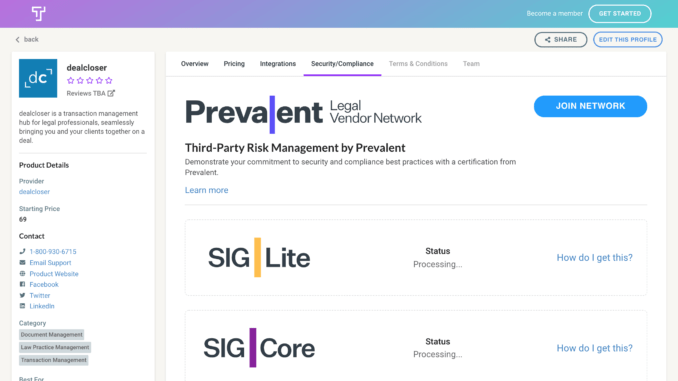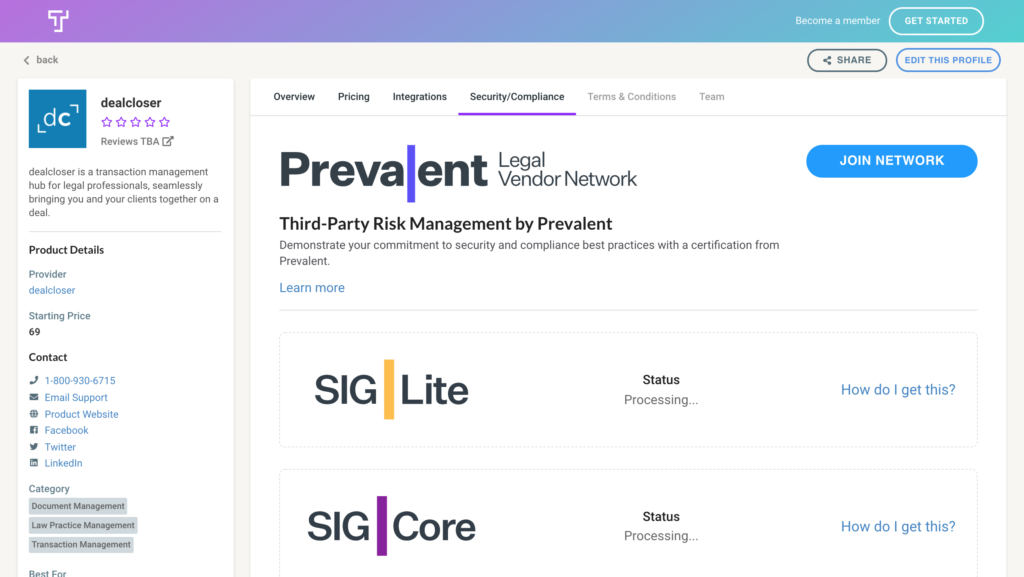
Legal tech app store, Theorem, is to offer vendors on its platform the ability to gain a security and risk assessment ‘badge’ via Prevalent, a tech testing company that works with leading law firms. The move will make it easier for law firms to use the dozens of applications already on the site.
This also adds to Theorem’s ability to compete with rival ‘app store’ Reynen Court, where one of its main selling points is that it handles security issues for law firms of third party software.
Theorem CEO, Joshua Maley, told Artificial Lawyer: ‘This will provide confidence to users and it’s also our way of standardising [security] for the legal market.’
Maley added that there are now just under 230 legal tech vendors that have signed up to the site, including several legal AI companies.
Prevalent works with a number of AmLaw top 50 law firms, including the likes of global firm Skadden Arps. However, in this model the law firms don’t need to ask Prevalent to do the testing of every application they use, instead they go onto the Theorem platform and can see which vendors have gained the security badge.
In terms of how it will work on Theorem (see earlier AL article on what Theorem offers and also extensive explainer interview below), each vendor will have the option of using Prevalent on their site page inside the platform. They can opt for different types of security and risk checks and Prevalent then provides them with a ‘badge’ to show they have passed a third party compliance test (see below).

Vendor security is not just a major issue in terms of protecting law firms from data loss, most types of professional insurance for lawyers demand that software they are using has the right bona fides to show it is safe to use.
In which case, Theorem’s partnership with Prevalent could prove to be a very useful step that removes any on-boarding friction that may remain in terms of using the platform.
Brenda Ferraro, vice president of third-party risk at Prevalent, said: ‘Our partnership with Theorem provides legal teams with the information they need to onboard vendors quickly, especially technology providers needed to remain productive, secure and competitive while working from home.’
How Does Theorem Work? – Interview with Theorem founder, Josh Maley
(This was published back in Feb this year, but it’s such a comprehensive overview of what Theorem does it’s definitely worth a read if you want a refresher on what the platform does and how it works.)
First, what is Theorem?
Theorem is a legal tech platform that surfaces tools and resources within a user’s workflow. We accomplish this by integrating our marketplace for legal technology with best-in-class workflow and automation software.
For firms: We help firms save time and money in discovering, assessing and buying legal technology, as well as avoid the unnecessary expense associated with subscribing to numerous redundant platforms.
We also help ensure that users at firms leverage platforms to which the relevant firm subscribes, which solves a major pain point given that many subscriptions that firms have are under-utilised.
For vendors: we put their solution in the hands of users, precisely when they need it, driving not only awareness of their service, but also adoption and increased utilisation and engagement.

Can you explain the difference in approach between vendors on the platform that firms already use, and those that they don’t use yet, but may want to try?
Firms have complete control over what recommendations their professionals receive. They can choose to display only their current technology subscriptions as well as enable their professionals to access alternatives that meet acceptable standards, while controlling spend.
Our goal is to help users engage with new technologies on a per transaction basis. So, for vendors to which the relevant firm does not subscribe, there is an opportunity to enable users to leverage their solutions while paying for them on a transactional basis.
Obviously, so long as the user experience goes well and there is value from the firm’s perspective, this should lead to the transactional engagement potentially becoming a subscription relationship.
How did you come up with this idea? What did you do before?
I started my career in finance and ended up as a partner at a private office investment fund focused on early stage investments. I will forever be grateful for the experience. I learned a lot about the impact technology was going to have on the world and how to build a business from first principles.
I also had my first experience with the inefficiencies of the legal profession. After graduating from Wake Forest Law, I saw an opportunity when I realised the difficulties the profession faced in adopting modern technology, and the lack of solutions.
Is this a competitor to Reynen Court?
We’ve been heads down and focused on our own mission, which is to deliver an ecosystem that benefits all sides of the marketplace. In this way, Theorem is redefining how the industry will adopt and engage with legal technology to enhance legal services delivery.
We understand the need to merge technology with people and process and that’s why we decided to combine our marketplace ecosystem with the ability to knit together apps in a no-code visual interface. As well, we’ve built integrations with existing core systems.
Both Theorem and Reynen Court strive to help drive technology adoption by firms and their clients, but Theorem extends beyond technology adoption to solving other problems that firms and in-house groups encounter on a daily basis.
How do you handle issues related to data security?
Data security is core to our architecture, but we are also striving to bring the entire vendor ecosystem up to the standards expected in an industry dependent on privacy and confidentiality.
You show pricing for the applications, were the vendors happy to share this info?
Vendors have incredible optionality on the platform, but we provide a number of incentives for vendors to display pricing. Our hope is that the market will drive standardisation.
In addition, our no-code recommendation engine makes it easier for vendors to offer transactional pricing models, which firms can access within workflows.
Finally, the platform has just got started, what is the road map ahead?
I’m incredibly proud of what our small team has built in a just a few short months. We’re on our way to becoming law’s complete innovation ecosystem, hosting the largest open legal technology marketplace. In response to the immense feedback, we’re excited to continue to develop our product to better serve our clients.
Our future is in the delivery and hyper-personalization of solutions for legal professionals in any given practice–anticipating a legal professional’s needs and making relevant and tailored suggestions so they can more effectively deliver for clients.
